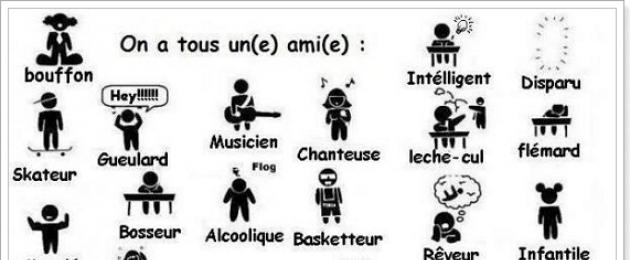Adjective in French, an important and integral part of speech, which allows you to define an object, its properties and characteristics. It changes in gender, number and degree of comparison, which agree with the gender and number of the noun to which it refers.
Gender and number of adjectives (briefly)
We have already discussed such a grammatical phenomenon as . Here we will consider only the basic concepts.
How the feminine gender of adjectives is formed: a masculine adjective receives the ending – e to form the feminine gender. Eg:
- Grand – grande – big – big
- Petit – petite – small – small
- Rusé – rusée – cunning – cunning
For example: une petite fille (little girl) – un petit garçon (little boy)
If the adjective ends in - With, in the feminine gender the ending changes to - che :
- Blanc c– blan che– white – white
- Fran c– fran che– open – open
- Se c– sè che– dry – dry
For example: Un homme fran c(frank man) – une femme fran che (outspoken woman)
Agreement of adjectives in gender and numberEnding - eur euse :
- Ment eur-ment euse- deceitful - deceitful
- Moq ueur–moq ueuse– mocking – mocking
For example: un garçon menteur (lying boy) – une fillette menteuse (lying girl)
Ending - teur in the feminine gender it becomes - trice:
- Observa teur– observa trice– observant – observant
- Interroga teur– interroga trice– interrogator – interrogator
For example: un professeur observateur (observant professor) – une élève observatrice (observant student)
Ending - eau goes into - elle:
- Nouv eau–nouv elle– new – new
- Jem eau– jum elle– similar – similar (twin – twin)
- B eau–b elle- beautiful - beautiful
For example: un nouveau ami (new friend) – une nouvelle amie (new friend)
Masculine ending - ou becomes feminine - olle:
- F ou– f olle– crazy – crazy
- M ou–m olle– soft – soft
Silent ending - s in the masculine gender it becomes voiced in the feminine gender:
- Françai s– françai se– French – French
Ending - f in the feminine gender it changes to – ve:
- Neu f-neu ve– new – new
Ending - eux goes to - euse:
- Heur eux–heur euse – happy – happy
Some French adjectives do not fit any rule, so you need to remember them:
- Bass – basse – low – low
- Blanc– blanche– white – white
- Frais– fraiche– fresh – fresh
- Gros– grosse– thick– thick
- Long– longue– long – long
- Pais– paisse– thick – thick
- Doux– douce– sweet – sweet
Plural adjective
The adjective in French also changes in number.
The general rule for forming plurals is to add the ending - s to a singular adjective.
- Différent – differents – different – different
- Petit – petits – small – small
- Pointu – pointus – sharp – sharp
Feminine adjectives have the same ending:
- Différente – differentes – different – different
- Petite – petites – small – small
- Pointue – pointues – sharp – sharp
Adjectives ending – al in the plural they get the ending - aux:
- Vertical – verticaux – vertical – vertical
Endings – s or - x in the plural remain unchanged:
- Gros – gros – thick – thick
- Heureux – heureux – happy – happy
 Everyone has a friend like that: examples of adjectives
Everyone has a friend like that: examples of adjectives Adjective location
In Russian, we are accustomed to the fact that the adjective is placed before the word that it defines: a cozy home, a beautiful girl, a tall man, etc. In French the situation is different.
Most adjectives are found after the word they define: un homme heureux, une chambre comfortable, un ami hospitalier.
Before nouns
The following adjectives are placed before the noun:
- Autre – different
- Beau (belle) – beautiful
- Bon (bonne) – good, kind
- Grand (grande) – big
- Gros (grosse) – thick
- Haut (haute) – tall
- Joli (jolie) – cute
- Long (longue) – long
- Mauvais (mauvaise) – bad, evil
- Nouveau (nouvelle) – new
- Petit (petite) – small
- Vilain (vilaine) – nasty
- Jeune - young
- Vieux (vieille) – old
BUT: if an adverb is used with these adjectives, then both words are found after the noun: un garçon très haut - a very tall boy. And if such adjectives have an addition, then they are also placed after the noun: le vin bon à boire - wine good for drinking.
Position of evaluative adjectives
Some French adjectives can be placed both before and after the noun. They do not change their meaning. These are evaluative adjectives that can be placed either before or after a noun without changing the meaning. But, if they stand before a noun, they acquire a subjective meaning. These are the adjectives:
- Délicieux – delicious; delicious
- Magnifique - beautiful
- Splendide – magnificent
- Superbe - amazing
- Horrible - terrible
- Extraordinaire - extraordinary
- Etonnant - amazing
- Formidable - incomparable
- Parfait is excellent
- Râvissant - beautiful
- Passionnant – exciting
- Merveilleux - wonderful
- Incroyable - incredible
- Admirable - wonderful
- Epouvantable – terrifying
- Excellent - excellent
- Remarquable – wonderful
The meaning of an adjective depending on its position
An adjective in French changes its meaning depending on its position. That is, when they are in front of a noun, they have one meaning; when they are after a noun, they take on a different meaning. Pay attention to the pattern of adjectives and their translation depending on their position: adjective – meaning after a noun – meaning before a noun.
- Amer – bitter (tastes) – bitter (figurative)
- Ancien – ancient – former
- Antique - antique - ancient
- Bas – low – low (figurative)
- Brave - brave - decent, nice
- Certain - certain - some
- Chaud – warm – warm (figurative)
- Cher – dear – dear (in circulation)
- Doux – sweet – tender
- Dur – hard – heavy
- Fameux - famous - excellent
- Faux – deceitful – false
- Fier – proud – rare, notorious
- Fin – subtle – skillful
- Fort – strong – intense
- Fou - crazy - crazy
- Franc – direct – obvious
- Froid – cold – cold (portable)
- Furieux – angry – very strong
- Gris – gray – sad
- Léger – light – frivolous
- Maigre - thin - pathetic, meager
- Méchant - evil - insignificant
- Mince - thin - insignificant
- Mortel – mortal – mortal
- Mou – soft – soft (figurative)
- Noble - noble - noble, sublime
- Pâle – pale – pathetic
- Pauvre – poor – unhappy
- Pieux – pious – good
- Plaisant – pleasant – cheerful
- Propre – pure – own
- Rare – rare – rare (figurative)
- Riche – rich – expensive (figurative)
- Royal – royal – royal (figurative)
- Rude – hard, harsh – big, strong
- Sacré – sacred – damned (BUT: in the names le Sacré Collège, Sacré-Cœur means “holy, religious”)
- Saint - sacred - holy
- Sale - dirty - vile, vile
- Seul – lonely – the only one
- Simple - simple - ordinary
- Triste – sad – bad
- Unique - the only one - the only one of what was
- Vague - indefinite - insignificant
- Vrai - truthful - true, real
- Vert – green, unripe – vigorous
- Vif – alive – strong (figurative)
But what to do if there are several adjectives that define a word? In this case, you need to start with more general characteristics, moving to the specific (that is, from general to specific):
- Une voiture japonaise noire – black Japanese car
- Un vin blanc français – white French wine
The adjective occupies a fundamental place in the French language, since it is this part of speech that will help you describe events and actions. Use as many adjectives as possible, look for synonyms for them, this will make your speech much more interesting and richer!
As is known, adjective- this is a part of speech that denotes the quality, property or belonging of an object and answers the questions “which?”, “which?”, “which?”, “which?” or “whose?”
In French, adjectives change according to gender and number, that is, they depend on the noun they refer to.
Rules for using adjectives
An adjective can be used without a noun and be part of a compound nominal predicate, for example: Il est petit- It is small. In this case, the adjective agrees with the subject in gender and number: il– masculine and singular pronoun. If in place of the subject there is a pronoun or a feminine noun, then the ending will be added to the adjective "e": Elle est petite.- She's small.
However, you need to remember that some masculine adjectives already end with the letter "e", this means they do not change by birth. There are few such adjectives, you need to remember them:
rouge- red
jaune- yellow
jeune- young
beige- beige
triste- sad
rose- pink
Some adjectives have a masculine gender after adding a vowel "e", the final consonant is doubled. This happens with adjectives with the following endings:
1. -en/-enne: europeen – europeenne(European)
2. -ien/-ienne: italien – italienne(Italian, -aya)
3. -on/-onne: mignon– mignonne(cute)
4. -as/-asse: bas-bass(low)
5. -os/-osse: gros-grosse(big)
6. -el/-elle: habituel - habituelle(regular)
7. -eil/-eille: pareil - pareille(similar)
8. -et/-ette: cadet - cadet(junior)
There are exceptions to this rule. Remember these words:
complet – complete(filled, -th)
concret – concrète(specific)
discrete– discrete(modest)
inquiet – inquiet(restless)
secret – secret(secret)
Adjectives ending in -eux or -eur in the masculine gender change to –euse: courageux - courageuse (brave). A similar rule applies to adjectives ending -teur: Feminine adjectives in this case receive endings -trice/-teuse: menteur - menteuse (lying). And the adjectives on -f in the feminine gender they get the ending -ve, for example: sportif - sportive.
If a masculine adjective ends in -er, then in the feminine it has the ending -ère: fier - fière (proud -aya), and the ending -With is changing -que: turc - turque (Turkish).
Some adjectives do not change their forms according to the rule. Try to remember:
vieux – vieille(old)
gentil – gentille(darling)
blanc - blanche(white)
frais – fraîche(fresh)
franc - franche(free)
sec – seche(dry)
doux - douce(gentle)
long – longue(long)
favori – favorite(favorite)
Interestingly, some adjectives have two masculine forms.
Adjectives beau, nouveau, vieux have two masculine forms in the singular: Forms beau, nouveau, vieux used before nouns starting with a consonant: un nouveau cafe- new cafe.
Forms bel, nouvel, vieil used before nouns starting with a vowel or silent h, For example: un vieil ami- old friend.
In the feminine gender, these adjectives use one form: belle, nouvelle, vieille.
Lesson assignments
Exercise 1. Form feminine adjectives.
1. conservateur 2. jeune 3. noir 4. doux 5. sérieux 6. joli 7. actif 8. beau 9. ancien 10. muet
Answer 1.
1. conservatrice 2. jeune 3. noire 4. douce 5. sérieuse 6. jolie 7. active 8. belle 9. ancienne 10. muette
1. The plural of adjectives in French is most often formed in the same way as for nouns, that is, by adding the ending -s.
For example:
un vase rouge - des vases rouges (red vase - red vases);
une belle table - de belles tables (beautiful table - beautiful tables);
une petite chambre - de petites chambres (small room - small rooms);
une ligne droite - des lignes droites (straight line - straight lines);
un mur bleu - des murs bleus (blue (blue) wall - blue walls).
The ending -s is not pronounced!
But in some cases, the plural of adjectives in French is formed according to different rules. They depend on which letter or combination of letters the singular adjective ends with.
2. Adjectives that end in -s or -x in the singular do not change in the plural.
For example:
un fils paresseux - des fils paresseux (lazy son - lazy sons);
un détail curieux - des détails curieux (a curious detail - curious details);
un voyage dangereux - des voyages dangereux (dangerous trip - dangerous trips);
un gros morceau - de gros morceaux (large piece - large pieces);
un vieux cahier - de vieux cahiers (old notebook - old notebooks).
But the adjective vieux in the masculine singular also has another form - vieil (used before a noun beginning with a vowel or an unpronounceable “h” (“h” muet)). In this case, the plural will be formed from vieux, for example: un vieil oncle - de vieux oncles (old uncle - old uncles).
3. Adjectives ending in -eau in the singular form take on the ending -eaux in the plural.
For example:
un beau jardin - de beaux jardins (beautiful garden - beautiful gardens);
un nouveau tableau - de nouveaux tableaux (new painting - new paintings).
But the above adjectives, which have another form in the masculine singular: bel, nouvel (used before a noun starting with a vowel or unpronounceable “h” (“h” muet)), form the plural from beau, nouveau.
For example:
un bel ami - de beaux amis (beautiful friend - beautiful friends);
un nouvel appareil - de nouveaux appareils (new apparatus - new apparatus).
It should be noted that in the feminine gender the ending -s is added to the plural adjectives belle (beautiful) and nouvelle (new): de belles places (beautiful places, squares), de nouvelles tasses (new cups).
4. Most adjectives that end in -al in the singular have an ending -aux in the plural.
For example:
un problème médical - des problèmes médicaux (medical problem - medical problems);
un pays tropical - des pays tropicaux (tropical country - tropical countries);
un festival international - des festivals internationaux (international festival - international festivals);
un principe fondamental - des principes fondamentaux (fundamental principle - fundamental principles).
But not all adjectives that end in -al in the singular end in -aux in the plural. For example, the adjectives fatal (fatal, inevitable), banal (banal), glacial (icy), natal (native), final (final, final, final) have the ending -s in the plural.
For example:
un pays natal - des pays natals (home country - home countries);
un but final - des buts finals (final goal - final goals);
un compliment banal - des compliments banals (banal compliment - banal compliments);
un vent glacial - des vents glacials (icy wind - icy winds).
The general rule is that the feminine gender of adjectives in French is formed by adding an "e" to the masculine form: un cahier bleu - une cravate bleue.
If the original form of the masculine adjective ends in “e”, no change occurs: un livre utile - une chose utile.
To form the feminine form, French adjectives can double the final consonant of the masculine form. The following cases are distinguished:
1. doubling “l” in adjectives ending in -el, -eil: un homme cruel - une loi cruelle, un sentiment pareil - une faiblesse pareille
The same thing happens in the words nul and gentil: une copie nulle, une manière gentille
2. doubling “n” in adjectives ending with -en, -on: une route aérienne, une fille bretonne
All other adjectives ending in “n” (-an, -in, -ain, -ein, -un), except for “paysan,” do NOT double the final vowel: la langue persane, une pièce voisine, une voix hautaine, une collection pleine, une chambre commune
But: la communauté paysanne
3. doubling “t” in adjectives ending with -et: une robe coquette
Attention: the final consonant “t” in the feminine gender is NOT doubled:
A. all other adjectives ending in (-ot, -at): une réponse idiote, une situation délicate
b. the following exceptions:
complet - complete
secret - secret
inquiet - inquiete
desuet - desuete
discret - discrete
concret - concrete
replete - replete
incomplete - incomplete
Many adjectives, when forming the feminine gender, in addition to adding “e”, simultaneously undergo the replacement of the final vowel form of the masculine gender:
a. f - v: naïf - naïve, bref - breve
b. x - s: adjectives ending in -eux and the adjective “jaloux”: heureux - heureuse, jaloux - jalouse
x - ss: faux - fausse, roux - rousse
x - c: doux - douce
With. s - c: tiers - tierce
s - ch: frais - fraîche
d. c - ch: blanc - blanche, sec - sèche
c - qu: franc - franque, public - publique, caduc - caduque, ammoniac - ammoniaque, turc - turque
Attention: grec - grecque
d. n - gn: bénin - bénigne, malin - maligne
The feminine gender of adjectives in French can be formed independently of any rule:
favori - favorite
rigolo - rigolote
esquimau - esquimaude
andalou - andalouse
Adjectives ending in -er, -ier have a spelling feature in the feminine gender: they acquire the so-called. grave accent over “è”: léger - légère, dernier - dernière.
When forming the feminine gender, some adjectives undergo changes in their original form:
nouveau - nouvelle
jumeau - jumelle
vieux - vieille
Formation of feminine adjectives in -eur:
If such an adjective is formed from an existing verb, then the suffix “euse” will be in the feminine gender. For example: menteur - menteuse (derived from the verb mentir)
Exceptions:
enchanteur - enchanteresse
detecteur - detectrice
- In contact with 0
- Google+ 0
- OK 0
- Facebook 0








